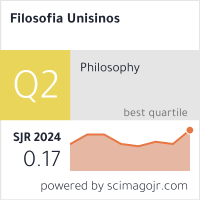Natural classes of tropes
DOI:
https://doi.org/10.4013/fsu.2014.152.05Resumen
Douglas Ehring (2011) has proposed a conception of natural classes of tropes to fulfill the roles usually attributed to universals. Natural classes of tropes can avoid the difficulties that affect the classic theory of tropes – as claimed by D. C. Williams and Keith Campbell – where tropes are simple and, by themselves, are particulars and have an intrinsic nature. Natural classes of tropes are also preferable to primitive resemblance classes of tropes, because they can explain the characteristics of the relation of resemblance and can also ground an internal relation of resemblance between tropes. It is contended here that the conception proposed works very differently whether tropes are conceived as modifier tropes or as module tropes. In the first case, tropes cannot be grouped directly in natural classes, because tropes have no intrinsic character. They ground the character possessed by their bearer, but they themselves have none. So, the character attributed to a trope due to its belonging to a natural class is dependent, on its turn, on the natural classes or the resemblance classes into which the objects that bear those tropes enter. In the second case, tropes do have a character. Then, they can enter ‘directly’ into natural classes. The problem in this case, though, is that tropes seem to have many different characters and seem vulnerable to the traditional problems of the ‘imperfect community’ and the ‘company’ that affect resemblance nominalism.
Keywords: properties, tropes, natural classes, resemblance classes, problem of the imperfect community, problem of the company.
Descargas
Descargas
Publicado
Cómo citar
Número
Sección
Licencia
Concedo a revista Filosofia Unisinos – Unisinos Journal of Philosophy o direito de primeira publicação da versão revisada do meu artigo, licenciado sob a Licença Creative Commons Attribution 4.0 (que permite o compartilhamento do trabalho com reconhecimento da autoria e publicação inicial nesta revista).
Afirmo ainda que meu artigo não está sendo submetido a outra publicação e não foi publicado na íntegra em outro periódico e assumo total responsabilidade por sua originalidade, podendo incidir sobre mim eventuais encargos decorrentes de reivindicação, por parte de terceiros, em relação à autoria do mesmo.










